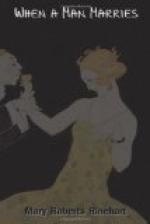She had violent hysterics for an hour, with Anne rubbing her forehead and Aunt Selina burning a feather out of the feather duster under her nose. Only Jim and I understood, and we did not tell. Luckily, the next thing that occurred drove Bella and her nerves from everybody’s mind.
At seven o’clock, when Bella had dropped asleep and everybody else was dressed for dinner, Aunt Selina discovered that the house was cold, and ordered Dal to the furnace.
It was Dal’s day at the furnace; Flannigan had been relieved of that part of the work after twice setting fire to a chimney.
In five minutes Dal came back and spoke a few words to Max, who followed him to the basement, and in ten minutes more Flannigan puffed up the steps and called Mr. Harbison.
I am not curious, but I knew that something had happened. While Aunt Selina was talking suffrage to Anne—who said she had always been tremendously interested in the subject, and if women got the suffrage would they be allowed to vote?—I slipped back to the dining room.
The table was laid for dinner, but Flannigan was not in sight. I could hear voices from somewhere, faint voices that talked rapidly, and after a while I located the sounds under my feet. The men were all in the basement, and something must have happened. I flew back to the basement stairs, to meet Mr. Harbison at the foot. He was grimy and dusty, with streaks of coal dust over his face, and he had been examining his revolver. I was just in time to see him slip it into his pocket.
“What is the matter?” I demanded. “Is any one hurt?”
“No one,” he said coolly. “We’ve been cleaning out the furnace.”
“With a revolver! How interesting—and unusual!” I said dryly, and slipped past him as he barred the way. He was not pleased; I heard him mutter something and come rapidly after me, but I had the voices as a guide, and I was not going to be turned back like a child. The men had gathered around a low stone arch in the furnace room, and were looking down a short flight of steps, into a sort of vault, evidently under the pavement. A faint light came from a small grating above, and there was a close, musty smell in the air.
“I tell you it must have been last night,” Dallas was saying. “Wilson and I were here before we went to bed, and I’ll swear that hole was not there then.”
“It was not there this morning, sir,” Flannigan insisted. “It has been made during the day.”
“And it could not have been done this afternoon,” Mr. Harbison said quietly. “I was fussing with the telephone wire down here. I would have heard the noise.”
Something in his voice made me look at him, and certainly his expression was unusual. He was watching us all intently while Dallas pointed out to me the cause of the excitement. From the main floor of the furnace room, a flight of stone steps surmounted by an arch led into the coal cellar, beneath the street. The coal cellar was of brick, with a cement floor, and in the left wall there gaped an opening about three feet by three, leading into a cavernous void, perfectly black—evidently a similar vault belonging to the next house.




